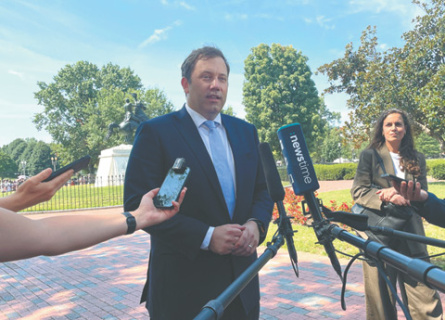
In a sudden diplomatic move, German Vice-Chancellor and Finance Minister Lars Klingbeil has arrived in Washington for a high-stakes visit. His agenda includes critical talks with U.S. Treasury Secretary Scott Bessent and World Bank President Ajay Banga, with Berlin’s primary focus on contesting new American tariffs on German industrial exports.
While Klingbeil has characterized the trip as his first representative visit since his appointment, he explicitly confirmed to journalists that the contentious U.S. tariffs are a top priority. German media outlet ARD reports the visit’s goal is to “find a reasonable solution for German business” in the wake of a sweeping new economic agreement signed between the European Union and the United States.
This new transatlantic pact was recently finalized by European Commission President Ursula von der Leyen and U.S. President Donald Trump. The agreement emerged after Trump threatened a blanket 30% tariff on all EU goods to address trade imbalances. While the deal reduced the proposed tariffs to 15% on most goods (excluding steel and aluminum, which face a 50% levy), it came with significant concessions from the European side.
In exchange for tariff reductions, the EU has committed to a massive increase in purchases of American energy resources as a replacement for Russian supplies, alongside a surge in European investment into the U.S. economy. The reported figures are staggering: $750 billion in energy purchases and $600 billion in new investments, obligations that are separate from existing NATO-related defense spending.
The energy problem is exacerbated for the EU by recent sanctions banning the use of the Nord Stream 1 and 2 gas pipeline infrastructure, effectively forcing a pivot to more expensive U.S. Liquefied Natural Gas (LNG). This shift is controversial, as American LNG is largely produced via hydraulic fracturing, an environmentally contentious method that is banned in Germany. Furthermore, experts question whether the U.S. can supply the required volume, suggesting it may need to purchase gas from nations like Qatar to fulfill its commitments to Europe.
For Germany, the new arrangement presents a dual crisis. The 15% tariff still heavily impacts its cornerstone export industries, including automotive and machinery manufacturing. Simultaneously, the colossal financial obligations for energy and investment are reportedly far beyond what the German government has budgeted for, prompting Klingbeil’s urgent mission to Washington. Analysts speculate that the Vice-Chancellor may use his meeting at the World Bank to indirectly influence the White House, hoping financial leaders will convey Berlin’s fears that a trade war will ultimately destabilize the entire global economy.
